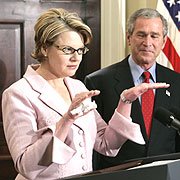Sunday, July 23, 2006
Trofim Lives!

Here is a compact definition of Lysenkoism from the educational site After Darwin:
In the U.S.S.R. of the 1930s, Trofim D. Lysenko rose to considerable power by claiming that his version of genetics, rather than that of Mendel and Darwin, could assist in the development of socialist ideology. If each successive generation of citizens had to be educated in Marxist ideology, he claimed, the utopia they envisioned would take too long to be realised. Rather, Lysenko rejected Mendelian heredity as bourgeois, and interpreted Marx as stating that man and nature are improvable and perfectable. He claimed, for example, that a winter wheat could be changed to a spring variety simply by altering the temperature at which it was grown, and that, by similar means, he could change wheat into rye in one generation. Darwin¹s struggle for existence, too, was dismissed as a bourgeois tool used to justify competition-based capitalist society. His erroneous assertions dominated Soviet biology for 30 years. He was eventually ousted, in 1965, due to rampant crop failures and shortages. Lysenkoism has come to represent the devestating consequences of marrying science to ideology.
We were ignorant of this history.
Monday, July 17, 2006
Lawyers Hopefully Close to Cure for Cancer

Cancer has been cured in mice, and the biological process may apply to humans. Researchers at Wake Forest University have accidentally discovered a strain of mouse that is immune to cancer. Better yet, when the immune mouse’s white cells are injected into normal mice, it cures their cancer.
The researchers were injecting mice with a lethal strain of mouse cancer cells, when one mouse did not die. So they increased the dose, and still the mouse stayed healthy. Since they failed to kill the mouse, they decided to breed it to see if the trait would be inherited. In 2003 they reported in The Proceedings of the National Academy of Sciences that the trait was inherited by all descendants. In a second paper just published, they reported that the colony is now 2,000 mice strong, all immune, and all with the trait that when their white blood cells are injected into normal mice with tumors, the tumors disappear.
Unfortunately, none of the mice have been shared with other groups because Wake Forest has not been able to reach agreements with other institutions on protecting its intellectual property. As a result, there has been no confirmation of the results by any outside group, and due to limited resources the specific gene involved has not been identified. Humans and mice have many of the same genes, and identification of that gene in humans may indicate humans possessing it are immune from cancer. If so, and if the injection of white blood cells from immune humans dissolves tumors in cancer patients, the long sought cure is at hand.
The intellectual property issues involve the potential claims to part of the pot that will be made by other scientists, institutions and drug companies who make contributions on the way to developing the cure. It is also not clear just how big the pot might be on this one. This is not one of those pills that cost little to manufacture and can be sold for a few hundred dollars a month to maybe or maybe not extend life. Here the threat of death is immediate, so thousands of dollars a shot is likely, more if the government pays for it for poor people. With billions potentially at stake, the legal issues have so far proved insurmountable.
It is not known when the legal breakthrough is likely to come. If you suspect you may have cancer, call your lawyer immediately.
Sunday, July 16, 2006
Science Evolves in Kansas

Dorothy actually said "Toto, I've got a feeling we're not in Kansas anymore”, not “We’re not in Kansas anymore, Toto.” It is important to get that right, as Dorothy was carefully stating a hypothesis that could be tested and disproved, a theory, not a fact. The fairy under the house and the immediate arrival of the good fairy were supportive evidence, but not proof. There could be fairies in Kansas. Still, a lot of people feel she was a bit too tenative.
In a democracy, these things are determined by majority rule, most commonly through our elected officials, and it has been established as a matter of fact that at that point Dorothy (and Toto) were not in Kansas. Even people who have not seen the movie are convinced. It is pretty much the same with evolution. Those voting for it feel it’s a theory, while those voting against it feel it’s a theory, while their own contrary view is an absolute fact. In those situations, the swing voters tend to go for certainty. This led the Kansas State Board of Education to revise the state’s science standards to include criticism of evolution. Given how humans have turned out, that is certainly a reasonable view.
While the Board was at it, they also revised the official definition of science, removing the words “natural explanations” from the old definition, which decreed “Science is the human activity of seeking natural explanations for what we observe in the world around us”. The old one wasn’t the greatest, but at least it wasn’t intimidating to the average high school student. The new definition has a bunch of stuff about hypothesis testing and experimentation, thus is more intimidating, but at least it leaves it open for the student who already knows the reason for everything to avoid a bunch of uncertainty. This is why we prefer to rely on elected politicians for this sort of thing. If you left it to most scientists, you would end up with some proposition like "a law of science can never be proved, it can only be used to make predictions that can be tested, and possibly proved wrong". Who wants to learn something that changes later?
Our old friend Galileo maintained that there were two equally valid ways to understand the divine, one by contemplation of the Bible, His Word, and the other by scientific contemplation of the world, God’s creation. The problem was he never really clarified what he meant by “scientific”.
Thursday, July 06, 2006
No College Left Behind

"How terrible it is to lose your mind. Or not to have a mind at all. How true that is."
The panel appointed by Education Secretary Margaret Spellings has issued a highly critical draft report on the quality of higher education, noting a lack of accountability to show students are learning anything. It found college education to be of uneven and “dubious quality”. However, the panel chairman described the draft as a “work in process” released “to further engage the public in our national dialogue.” The deputy press secretary for the Department of Education said Ms. Spellings had not read the report, but looked forward to reviewing it when it was final.
The report said both teachers and students should be better prepared, and students should not be in college learning things they should have learned in high school. It advocated regular testing to measure student learning, particularly in math, reading and critical thinking, and the posting of the results on the internet in such a way that prospective students could see how much they would learn at that various institutions. It did not get into detail about students who are not taking math, or reading or thinking for that matter.
There was dissent. Robert Zemsky, a professor of education, said the report did not reflect his views, and “is really by the staff and the consultants and not by the commission.” However, the professor, referring to the process that produced the report, misspelled the word “bollixed”.
Monday, July 03, 2006
Florida: American History is Knowable, Not Some Construct

In 1763 the Timucua, originally the most numerous native people of Florida, were exiled to Cuba and subsequently eradicated. You probably didn’t know that, as it is not in most history books. In the first place, it was prior to the Declaration of Independence, the universal principles upon which we were established. You see, to understand history, you have to deal with abstractions. Abstraction is the process of picking the important facts to get to the essentials we call reality. In a democracy, we vote, through our elected representatives, on the assortment of facts that make up reality. That is called the establishment function.
Now nobody likes someone messing with reality. Historians (hist-libs) tend to want to slip in new facts and change old ones, in the process disturbing reality. We have been discussing the challenges legislatures face in deciding what is good. Historically speaking, that requires picking the essential facts.
The Florida legislature, in its recently enacted education statute, provides that American history “shall be viewed as factual, not as constructed” and as “knowable, teachable, and testable.” So there. Further, “the history of the United States shall be defined as the creation of a new nation based largely on the universal principles stated in the Declaration of Independence”. The statute goes on to enumerate these principles, including “natural law, self-evident truth, equality of all persons, limited government, popular sovereignty and inalienable rights of life, liberty and property” (how can anyone be against self-evident truth?). Of course, not all of that (like limited government and rights of property) is literally in the Declaration, but it is in the penumbra.
Most of us prefer the Declaration of Independence to the Constitution anyway. The founders actually voted for the war before they voted against it. Plus it is shorter and catchier. It is a lot easier to remember “that all men are created equal, that they are endowed by their Creator with certain unalienable Rights, that among these are Life, Liberty and the pursuit of Happiness.” than it is all that detail about what fraction of a person a slave is (I think it was 3/5. Indians were zero).
Saturday, July 01, 2006
Breast Feeding Good, No Bull, Says Government

As noted in the June 28 post, deciding what is good is the third rail of effective government. An important corollary of course is deciding what is bad. In fact, bad may be even more important, since a lot of people feel free to ignore what is merely good (how are you doing on your dark leafy greens?), while bad can get the class action lawyers onto you. And what about all those things that haven’t been labeled by legislatures or the courts? When you’re good you’re good, and when you’re bad you’re bad, but when you’re only half way good you’re neither good nor bad.
At long last the government is doing something about breast feeding. The two year national breast-feeding campaign by the Office of Women’s Health in the Department of Health and Human Services included TV commercials showing a pregnant woman being thrown from a mechanical bull at a bar, and noted that it was the same thing to fail to breast feed. Senator Tom Harkin has proposed requiring warning labels on infant formula, like on cigarettes. That should get mothers’ milk out of limbo.
This is a sensitive area, and you can’t count on the courts here. Sure, mothers should be liable for all that damage, which includes acute infections and chronic diseases, not to mention lower IQs and obesity, but lawyers know there is always going to be some old coot on the jury mewing about motherhood and so on. No way are they taking your suing your mother on a contingency basis.
There is some dissent. Ellen Galinsky, president of the Families and Work Institute, says “I am concerned about the guilt that mothers will feel. It’s hard enough going back to work.” Look at poor Karen Petrone, an associate professor of history at U of Kentucky. “I desperately wanted to breast-feed”, but when her babies failed to gain weight, she had to supplement with formula. “I felt so guilty. I thought I was doing something wrong. Nobody ever told me that some women just can’t produce enough milk.” And think about all those women who don’t even have a college education.
While guilt has not yet been legislatively determined to be good or bad, it feels bad, so Senator Harkin might want to make it clear on the label that formula is bad, except when natural production is inadequate, at which point it is good. As we have pointed out, this good and bad stuff is the toughest job a public servant faces.